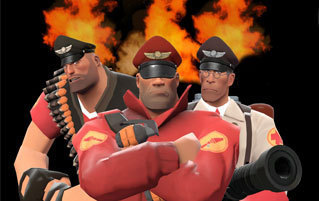The 5 Most Ludicrously Expensive Items in Online Gaming

Video games are pretending that their coins are real, and it's working. People are paying real money for pretend items. That's like catching STDs just from watching Jersey Shore. Paying for video game items is like paying child support for a wet dream.

"Can't afford tissues now that I have to dream of a college fund."
Virtual goods can be worth money. A new level pack a year after release extends your game. And if someone spends a week designing a 3D My Little Pony cock for your Second Life avatar, I am fully in favor of any transaction that keeps you both safely indoors. But modern game developers have become Bizarro kidnappers, hacking off parts of your favorite things and sending them if you do give them money. The second type of downloadable content (DLC) scam is even worse, selling "better" weapons that do more damage. You should only get money for changing a few numbers in a computer if you're a hacker in the '80s. Behold, purchases of stupider imaginary things than Tila Tequila's virginity. The Unseen Sword -- Age of Wulin
Age of Wulin is a massively multiplayer game set in the world of wuxia novels. That's the best idea ever. Wuxia fiction is martial arts soap operas where the only thing more shocking than discovering that your mortal enemy was your true love's father was the Heavenly Lightning Fist you mastered to defeat him. Wuxia makes fantasy settings look like a load of underevolved, unimaginative idiots running around banging bits of scrap metal against each other. Which, thanks to Orcs and Conan, is 90 percent of the case.

Orcs, saving monster designers the bother since the vaguely Middle Ages.
It's such a good idea that Age of Wulin made over $20,000 at a virtual auction before it even existed, at which point the term "good idea" is destroyed more tragically and expensively than spontaneous combustion in a bank vault. Because 16,000 of those dollars were spent on the Dragon Slaying Sabre and Scabbard.

Note the reporter wearing extra layers to insulate herself from the crazy.
The blade was expensive because it would be the only one in the game. The game that no one had played yet. Spending $16,000 on an item in an unreleased game is like buying your unborn child a human-leather masturbation glove: crazy, premature, and making all kinds of terrible assumptions for a self-involved waste of money. And that would still be a better purchase, because the glove won't disappear when (not if) the developers switch off the servers.
Legendary blades are a huge part of wuxia novels, usually as swords so sharp, they stabbed the deus ex machina to take its place, but buying one is how you become the bad guy. If this were a real wuxia story, everyone else's first and only quest would be "defeat the fool who gilds the grip of a warrior's blade." For that much money, the sword had better be Excalibur, complete with a lake and genuine mermaid to hold it. And even if it taught real sword fighting, it wouldn't be worth it because we have guns now.

"I called 'no shootsies,' so put those guns down and take your stabbin's!"
Capcom has used the Smurfs for Smurf's Village, and it was a less brutal screwing than when Hustler used them for porn.

Which was still more faithful to the source material than Transformers.
Capcom is known for milking every possible dollar out of any possible franchise, but this time they didn't even bother to create one. Smurf's Village is FarmVille with two-thirds of the RGB cable unplugged. It's a clicking-on-things game for people who incorrectly think they have too much self-respect to play with an old Simon game.

And this didn't make you wait 15 minutes to push the next button.
If you don't want to sit around waiting until the next time you're allowed to click on something, you can spend money on Smurfberries, which means you're paying for the exact same benefit you would get by stopping playing. The berries are available in bundles, up to a wagon for $100.

It would be less despicable if they were selling crack, because at least that's a product that takes labor to prepare.
This has to be a psychological experiment to see how disconnected people are from the reality of money. If I found out this was a phishing operation to fund a military takeover of my house, I'd still be relieved that it was actually doing something. Of course children have bought them. Loads of them! Because the Apple purchase password stays valid for 15 minutes, kids have racked up bills of $1,400. But that's like a machine gun accidentally shooting someone 14 times. It's not a mistake; that is exactly what that device was designed for, and it should never have existed in the first place.
Capcom obviously pulls the "We recommend parental guidance" excuse, but if the parents had time to actually deal with the kid right now, they wouldn't have given them an OCD simulator to shut them up. This is the app equivalent of a windowless van with the locks on the outside. It could not be more brutally harvesting children through games without starring Ender Wiggin. The last company to extract money from children so viciously was a Victorian coal mine.
Dark Orbit is a free-to-play multiplayer 2D space combat game where you click on things to shoot at them. That's all. If you've ever rearranged the applications on your desktop before launching them, you've already played it. The keyword is "free-to-play," meaning that you'll be utterly dominated by richer people. Which is weird, because these games aren't meant to be realistic.

"I now require that you prance for me."
It's set in a world where entropy acts on your account instead of your energy. Everything costs one of several game currencies that can be bought for real money. One of the very first options you have in the tutorial is paying for a better beginner mission. It's a multiplayer space shooter where you have to pay to repair your ship when you're shot, unless you stick with the beginner ship, which respawns for free but blows up every time it even suspects an enemy laser beam. So playing for free is volunteering to be the waves of Space Invaders in the game someone else has paid for. If Super Mario Bros. were free-to-play, it would cost more to rescue the pretend princess than to marry a real one.

"Maybe she is, but I've only got 37 coins. You doin' anything inexpensive tonight, baby?
I think you mushroom chicks could really grow on me."
As with all free-to-play games, the top-level items can technically be earned by playing, in the same way Mount Everest can technically be whittled into an attractive paperweight. Everyone who's ever played free-to-play games has had sessions ruined by some douchebag cruising in with a platinum tank firing diamond shells, but in Dark Orbit, that's the entire point. Developer Bigpoint announced that they were going to flat out sell the most expensive and powerful unit in the game for the Uridium equivalent of $1,300, which is well-named, because if you buy it, you have indeed been ridden by the developers. In other games, there's an illegal market for currency, and players are banned. In Dark Orbit, the developers give them a receipt.

"With 10 drones, you have reached maximum level -- thank you for shopping Dark Orbit!"
Drones enhance weapons and shields. Ships can only be fitted with eight regular drones, an elite ninth, and this incredibly difficult to acquire 10th. Bigpoint was flat out selling a permanent 11 percent advantage over every other player in the game, and over 2,000 players took them up on it, using real money and existing in-game currency. Even worse, millions more players continued playing a game so obviously broken that the developers just publicly said "Give us more money and we'll let you win." People have done less humiliatingly obvious and un-fun things for money while married to Hugh Hefner.
Burning Flames Team Captain -- Team Fortress 2
Buying the weapons in most free-to-play games is like hiring a sex worker to bend over your family's Monopoly board -- you're having fun, but screwing over the game for everyone else.

But that's a bad example, because that's the only way to have fun while playing Monopoly.
Team Fortress 2 avoids this by selling alternate weapons instead of better ones. Each unlock adds to the game without winning it, and you're not held at the mercy of random drops or spending money because you can smelt down items you don't want to get the ones you do. My favorite is the Brass Beast, increasing damage output but decreasing speed, because when I go Heavy, I DON'T NEED TO MOVE, THE IMMINENTLY CORPSED BABY MEN KEEP COMING TO ME!

Puny snipers have plan to kill everyone they meet. I have plan to kill everyone EVER.
As long as you don't fall for the key scam (a lottery for pretend items bought with real money), you're fine. This is the only game where the ludicrously expensive item comes from players instead of the company, because TF2 gamers make a cargo cult look like Houston Mission Control. They've conjured a massive trading market out of nonsense where novelty items aren't just worth money, but have actually become units of currency.

The OS wars cease screwing around.
The result is a massive economy based on refined junk and iPod earbuds. It's like Portland after a nuclear war. And it still makes more sense than bitcoins. The most prized possessions are hats -- TF2 players worship the most-millinered ones more than Roman Catholics -- leading to the literally head-melting villainy that is the most expensive item in the game: the Burning Flames Team Captain.

MY HEAD IS ON FIRE AND THIS IS MY VOICE!
The hat now costs 100.5 virtual earbuds, 2,412 virtual keys, with a cash value of 4,407 real actual dollars. The hat confers absolutely no game benefit apart from the respect of equally crazy people. Or letting you pretend to be M. Bison. Which doesn't quite make up for how the most expensive item in the game is one that uses special effects to highlight your head in a game where at least 11 percent of all players are snipers.

"Let's see you kill 'everyone ever' with a burning crater for a face, mate."
Peter Molyneux has made a career out of overhyping good games until everyone hates them. If he sold chocolate, he'd start advertising it six months in advance as a new form of oral sex that cured hepatitis, and even now we'd still be disappointed every time we put some in our mouths.

On an unrelated note, some stock photographers are clearly screwing with both us and their models.
Which may be why his new company 22Cans gave him the worst game in the world. Curiosity was a vast, multi-layered virtual construct tackled by every player in the world simultaneously. It sounded awesome, and it looked like the Internet in an '80s cyberpunk movie.

Every shaft of light is another player. That one at the top right is LippsInc4Evah.
Then you zoom in on a game that makes FarmVille look like an MIT graduate course.

The same view you get in solitary confinement.
Players tapped on blocks to break them. Sixty-nine billion of them. And they did it! This Curiosity does the exact opposite of NASA's, using technology to prove that the human race really isn't worth it. The big draw was that a "life-changing secret" would be revealed at the center. After nine months of taking the piss out of the idea of a tool-using species, the big secret was that a game developer was developing a new game. And they were giving rule-making control to the random time waster who had nothing better to do than click the last block.
Before launch, Molyneux talked up a fabulous "diamond chisel" that would cost $77,000. In the game, you couldn't actually buy it for cash -- thereby proving that Molyneux pathologically lies about features even when they're the worst features in the entire world -- but for 3 billion game coins. Coins could be reliably harvested at about 12,000 per minute. The only explanation is that Molyneux has a fatal heart defect and is trying to find sacks of harvestable organs that won't be missed.

"I'm here to hype up a middling good game with all the emotion and accuracy of a televangelist! Also, we'll need a blood sacrifice!"
But that was only the third worst item for sale. The second worst was instantly removing half a million blocks from the next layer for $10. That's all. You've already volunteered for a chore so pointless that the machines will consider our extermination a mercy killing, and now you're paying real money to skip doing it. When someone is that stupid and lazy, their DNA doesn't even bother to uncoil, because it knows they'll never reproduce.
The absolute worst and most expensive item was paying another $10 to add half a million blocks back on to the next layer. The program was already unworthy of the word "game," and this purchase still allowed people to take it from zero to worse than nothing. They were spending money to cancel out other people's already pointless lives. These blocks truly were the most expensive items in the game. The diamond chisel might have cost months of the player's life, but I guarantee that if they clicked long enough to get it, that life was not worth $10.
Luke is horribly aware that at least one person is now watching that Smurf porn. He also has a BRAND NEW website, tumbles, and responds to every tweet.
For more gaming insanity, check out the 5 Most Disastrously Copied Video Games, or join in by Busting Call of Duty's Ghosts.
Or you can behold 6 A-Holes You Meet in Every Online Game and The 7 Most Impressive Dick Moves in Online Gaming History.